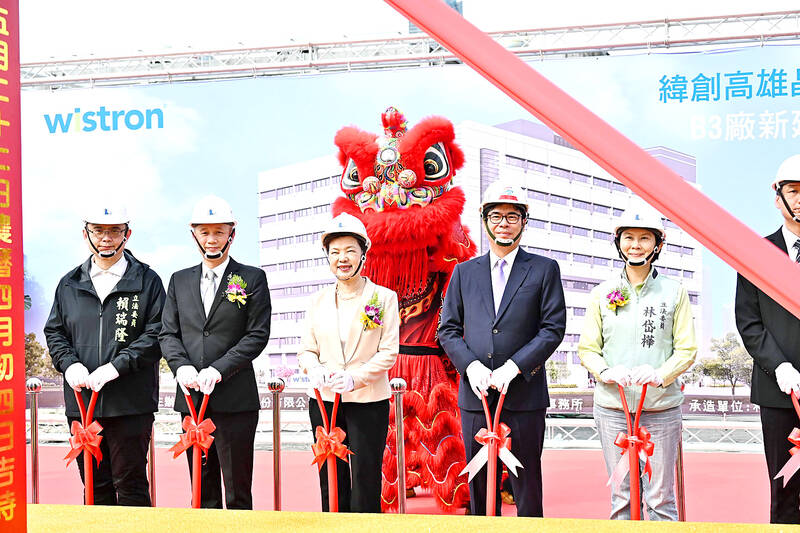Kaohsiung Opto-Electronics Inc (KOE, 高雄晶傑達光電), a subsidiary of contract electronics maker Wistron Corp (緯創), yesterday broke ground for its new manufacturing and research and development (R&D) facilities in Kaohsiung’s Cianjhen Technology Industrial Park (前鎮科技產業園區).
The company’s initial investment in the facilities is estimated to be more than NT$10 billion (US$325.98 million), the Ministry of Economic Affairs said in a statement.
The company plans to build a “smart, innovative” plant with nine floors above ground and two below, the ministry said.

Photo: Ge You-hao, Taipei Times
KOE plans to establish high-end, fully automated production lines at the plant that would be mainly engaged in the manufacturing of LCD panel modules for vehicles, and industrial control and medical applications, the ministry said.
The project is forecast to create 4,500 jobs upon its completion in 2025, it added.
Minister of Economic Affairs Wang Mei-hua (王美花) said at the groundbreaking ceremony that KOE aims to use Cianjhen Technology Industrial Park as a key production base for its automotive and industrial control panel manufacturing.
By integrating the park’s resources with nearby Southern Taiwan Science Park (南部科學園區) and Nanzih Technology Industrial Park (楠梓科技產業園區), along with the support of Wistron’s R&D facilities in Kaohsiung, the technology industry in southern Taiwan is expected to develop further, driving regional development, industrial transformation and local employment, Wang said.
Established in 1967, KOE was known as Kaohsiung Hitachi Electronics Co (高雄日立電子) before its name changed in 2012 as a subsidiary of Japan Display Inc. It was acquired by Wistron in October 2021.

Taiwan Semiconductor Manufacturing Co (TSMC, 台積電) secured a record 70.2 percent share of the global foundry business in the second quarter, up from 67.6 percent the previous quarter, and continued widening its lead over second-placed Samsung Electronics Co, TrendForce Corp (集邦科技) said on Monday. TSMC posted US$30.24 billion in sales in the April-to-June period, up 18.5 percent from the previous quarter, driven by major smartphone customers entering their ramp-up cycle and robust demand for artificial intelligence chips, laptops and PCs, which boosted wafer shipments and average selling prices, TrendForce said in a report. Samsung’s sales also grew in the second quarter, up

LIMITED IMPACT: Investor confidence was likely sustained by its relatively small exposure to the Chinese market, as only less advanced chips are made in Nanjing Taiwan Semiconductor Manufacturing Co (TSMC, 台積電) saw its stock price close steady yesterday in a sign that the loss of the validated end user (VEU) status for its Nanjing, China, fab should have a mild impact on the world’s biggest contract chipmaker financially and technologically. Media reports about the waiver loss sent TSMC down 1.29 percent during the early trading session yesterday, but the stock soon regained strength and ended at NT$1,160, unchanged from Tuesday. Investors’ confidence in TSMC was likely built on its relatively small exposure to the Chinese market, as Chinese customers contributed about 9 percent to TSMC’s revenue last

On Tuesday, US President Donald Trump weighed in on a pressing national issue: The rebranding of a restaurant chain. Last week, Cracker Barrel, a Tennessee company whose nationwide locations lean heavily on a cozy, old-timey aesthetic — “rocking chairs on the porch, a warm fire in the hearth, peg games on the table” — announced it was updating its logo. Uncle Herschel, the man who once appeared next to the letters with a barrel, was gone. It sparked ire on the right, with Donald Trump Jr leading a charge against the rebranding: “WTF is wrong with Cracker Barrel?!” Later, Trump Sr weighed

LOOPHOLES: The move is to end a break that was aiding foreign producers without any similar benefit for US manufacturers, the US Department of Commerce said US President Donald Trump’s administration would make it harder for Samsung Electronics Co and SK Hynix Inc to ship critical equipment to their chipmaking operations in China, dealing a potential blow to the companies’ production in the world’s largest semiconductor market. The US Department of Commerce in a notice published on Friday said that it was revoking waivers for Samsung and SK Hynix to use US technologies in their Chinese operations. The companies had been operating in China under regulations that allow them to import chipmaking equipment without applying for a new license each time. The move would revise what is known